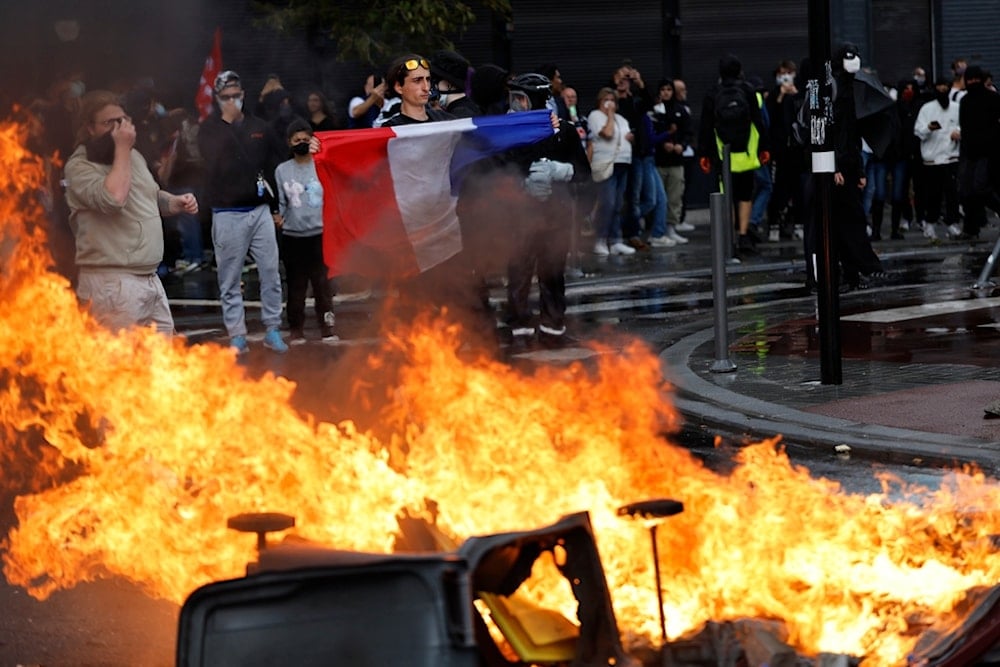France erupts as 200,000 join 'Block Everything' protests
France’s political crisis deepens as the protests against the government's austerity measures draw tens of thousands of participants, with dozens of arrests recorded just yesterday.
-

A protester of the "Block Everything" movement displays a French national flag next to burning cabbage bins in Lille, northern France, Wednesday, September 10, 2025. (AP Photo/Jean-Francois Badias)
Nearly 200,000 people demonstrated across France on Wednesday as part of the “Block Everything” campaign opposing government budget reforms, Interior Minister Bruno Retailleau announced at a press conference.
Retailleau noted that young people were “particularly represented” in the nationwide movement, while accusing far-left and ultra-left groups of hijacking the protests. Despite “very, very numerous attempts” to disrupt daily life, he insisted that “blockers did not block France.”
According to official figures, authorities recorded 812 separate protest actions across the country.
In Paris, clashes erupted near key sites including Porte d’Aubervilliers, several high schools, and the Gare du Nord train station. Police used tear gas to disperse crowds, and multiple trash bins were set ablaze.
A building in the Chatelet district caught fire, prompting a major response from firefighters. Eyewitnesses told Anadolu that the blaze began after police fired tear gas.
Shops were also affected. The Forum des Halles shopping mall in central Paris was temporarily closed after online calls for looting circulated as demonstrators marched toward the complex.
Nationwide disruptions
The unrest extended beyond the capital, impacting air travel. The Directorate General of Civil Aviation reported delays and cancellations at airports in Marseille, Nice, Bastia, Ajaccio, Figari, and Calvi.
Authorities launched an exceptional security operation, deploying 80,000 police officers and gendarmes supported by drones, helicopters, and armored vehicles. Retailleau instructed security forces to “intervene quickly and be agile” to prevent blockades of strategic infrastructure. He also accused some political figures of seeking to “create an insurrectional climate in France.”
The movement stems from social media calls urging citizens to “Block Everything” on September 10 in opposition to outgoing Prime Minister Francois Bayrou’s budget plan. Originating with the online group Les Essentiels, the campaign urged, “On Sept. 10, we stop everything, not to escape, to say no.”
The far-left France Unbowed (LFI) party has since voiced support, while major trade unions have called for another nationwide day of mobilization on September 18.
In a related development, police reported more than 300 arrests nationwide, including nearly 200 detentions in Paris alone.
Wider context
The protests come amid growing political instability. On Monday, Bayrou lost a vote of confidence in the National Assembly, following opposition to his 2026 budget framework aimed at cutting €44 billion in public spending. France’s public debt currently stands at 113% of GDP, one of the highest in the European Union.
In response to the crisis, French President Emmanuel Macron appointed Defense Minister Sebastien Lecornu as the new prime minister on Tuesday. Lecornu has been tasked with consulting political parties before forming a new government.
Budget-related political infighting has become a persistent issue in French politics. Last year, the failure to pass the 2025 budget led to the collapse of Michel Barnier’s government after a no-confidence motion united both far-left and far-right parties.
In parallel with the grassroots movement, France’s major trade unions have announced a national day of mobilization on September 18, signaling a broader, more coordinated wave of resistance to the government's economic policies.
As tensions mount, the coming weeks are expected to test both the resilience of the protest movement and the ability of the Macron administration to restore political and economic stability.

 3 Min Read
3 Min Read










